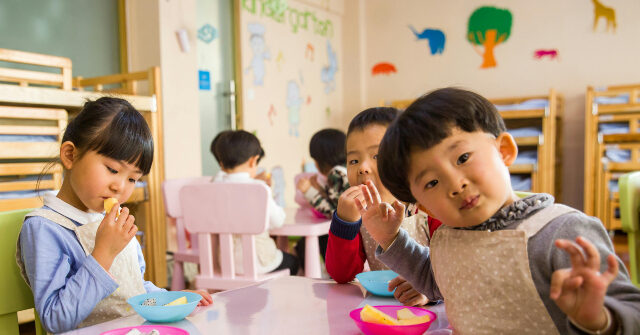China’s State Council, the rough equivalent of a presidential cabinet, has taken an interest in the investigation of a small-town kindergarten near the northwestern city of Tianshui, where hundreds of children were found with dangerous amounts of lead in their bloodstreams.
The story became a national scandal after hundreds of children were hospitalized with lead poisoning in late June.
Blood tests ultimately discovered high levels of lead in 233 out of 251 students at the Heshi Peixin Kindergarten, located in the Maiji suburb of Tianshui. 201 of those students required hospitalization.
Investigators tested food served to the children and found incredibly high levels of lead in two items, a red date steamed breakfast cake and a sausage corn roll. Both contained over a thousand milligrams of lead per kilogram of product.
China’s food safety standards call for a maximum amount of 0.5 mg of lead per kilogram of food. The levels found in the Heshi Peixin children could cause permanent liver, stomach, brain, and nervous system damage.
Upon further investigation, the police determined that the food was poisoned on the orders of principal Zhu Moulin and the school’s financial backer Li Moufang, who told kitchen staff to buy paint online and mix it into the food to make it look more appetizing. The paint they bought was clearly labeled as unsafe for human consumption.
What blew the case into a nationwide scandal was the suspicion of Maiji parents that local officials, and even doctors at the local hospital, attempted to conceal the extent of the lead poisoning.
Sky News sent some reporters to the town last week, and many of the residents said the local hospitals reported much lower levels of lead in the blood of the children than out-of-town hospitals. Local parents began driving up to 200 miles to bring their children to hospitals they could trust.
“I don’t know much, but I think this is a cover up. I just think the local government is too dark, they suppress the news,” one Maiji resident told Sky News.
“Who will be willing to have children? Who dares to send the children to kindergarten?” cried another.
“There is clear anxiety about the fact we are here. The police intercept us and hold us up for over an hour. And perhaps that is no surprise because in China a history of food safety scandals is a sore point,” Sky News noted, pointing to scandals around cooking oil and milk powder in 2024 and 2008.
Sky News obtained video of the school chefs actually dumping paint powder into the children’ s food, causing the rage on Chinese social media to become incandescent. Critics noted the provincial and national governments were very slow to reveal the full extent of the horror, including how many children were affected and how high their contamination levels were.
“The children only eat three-color jujube steamed cake and corn sausage rolls once or twice a week, how could they be poisoned so seriously?” the mother of one affected child asked.
“If something like this happened to the children in school, at least give us an explanation. Now there is nothing,” she complained.
To make matters worse, local parents revealed their children began complaining of stomach pain, muscle pain, and reduced appetite in March, so they could have been unwittingly ingesting toxic chemicals for over three months.
Police raided the kindergarten and detained Zhu, Li, and six staff members. According to the chief of police, school administrators got the bright idea to dump paint in the food because they wanted it to look more appealing in brochures and online advertisements to “attract more enrollment and increase revenue.” The sausage buns were painted to look like yellow corn on the cob, for example.
The State Council got involved on Saturday night, dispatching a “task force” to work with officials in Gansu province. The provincial team includes Hu Changsheng, the local head of the Chinese Communist Party. Experts from the national environmental and health ministries are also reportedly involved.
Read the full article here


